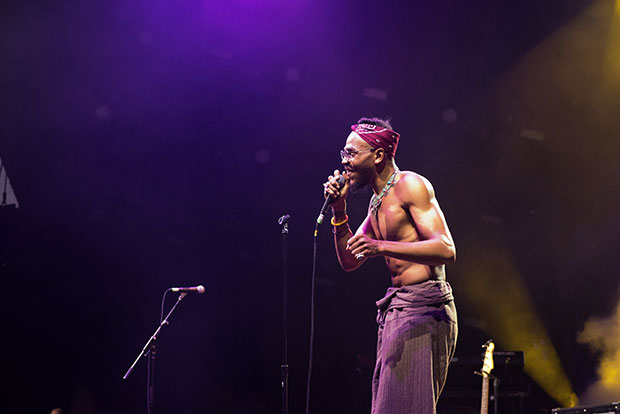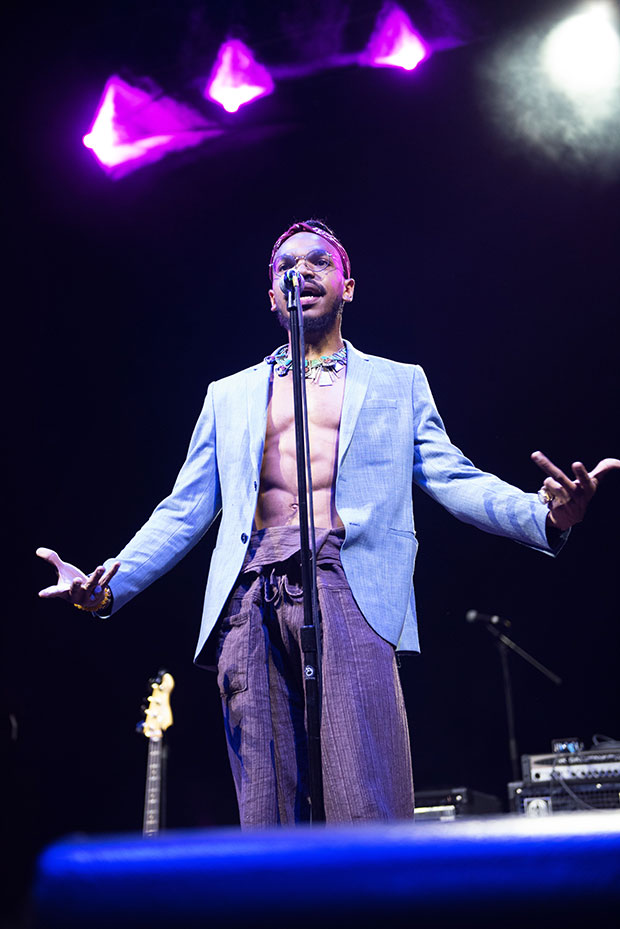What is happiness? And how does one achieve it? If KAMAUU holds the answers to both, expect him to share them, especially when he takes the stage during the Sound Mind Live Music Festival for Mental Health on Saturday, May 21. Taking place in Central Park’s SummerStage in New York City, the festival features KAMAUU, American Authors, Wrabel, Allison Russell, and Cold War Kids, with Outkast’s Big Boi headlining the event. “I think the name of it, in general, is very beautiful,” KAMAUU tells HollywoodLife in an EXCLUSIVE interview. “It’s not ‘happy mind.’ It’s not ‘peaceful mind.’ It’s ‘Sound Mind.’ ”
“I think one thing that’s beautiful about martial arts, it’s not about violence or peace,” adds KAMAUU. “It’s about harmony preservation. And one of the goals of martial arts is to be able to create an inevitably sound mind. We can feel all the feelings, but can we have the mental clarity to see what the feelings are for, what they’re from, and how we can use them?

“And so Sound Mind Live Festival, I think, there’s so many names that you could have used to talk about a festival that is promoting and spotlighting the importance of mental health, and a lot of the names that I think could have been used could have been well-intentioned, but not as effective,” he adds. “I think that ‘Sound Mind’ is very effective. So just in its name, I think this was really a well-articulated event.”
Well-measured in thought and verse, KAMAUU has infused his music with unparalleled levels of heart and soul. It’s hard not to come away from a KAMAUU song unchanged, as his voice alone summons a bevy of emotions in each song. Add the lyrics of a curious mind, one who is unafraid to show vulnerability and humility, and it’s easy to see why many consider KAMAUU to be a magnificent talent unlike any other.
One of his best songs – arguably the funkiest – is “MANGO,” his collab with Adi Oasis. While R&B is littered with songs about scornful rejection and tracks about winning a former lover back, “MANGO” sees KAMAUU respectfully move on from a relationship out of love for the other. (“If he loves you truly / how could I not love him too / if he improves you / more than I used to.”) It’s a monumental statement not often found in song. Where exactly does this understanding, this healthy mind-frame, come from?
“I think, in general, culture is the connecting piece, and the function of culture is to preserve a people. So health is an essential function of culture,” KAMAUU tells HollywoodLife. “Obviously, a lot of culture, and the traditions that make up a culture, come out of those practices that, at least one point, were thought to have a beneficial impact on the practitioner. If someone’s throwing salt on a window sill, it’s because, at that time, they thought it was helping ward something off. So, in general, a massive underlying theme of culture is to preserve the people and encourage growth in that people.”
“A lot of the music that I think we find culturally around the world is, at least, not destructive, especially traditionally. I think that, let’s say, the common special understood necessity of… and that responsibility to maintaining your own wellbeing so that you can contribute to the communal wellbeing.”
“So health, more important than happiness is health and strength, because happiness is a bit of a feeling, and all the feelings are inevitable and necessary,” he shares. “And the point is not necessarily to experience happiness exclusively but to be able to move through all the emotions and be able to use the nutrients that we get from those emotions to make productive out of them so that we can grow from all of them. And I think music can be therapeutic for me.”
“There’s a big desire for me to share the therapeutic nature that I have listening to and creating music with other people,” he says. “So if I don’t know necessarily the exact right perspective to have, at least I could share the fact that it’s therapeutic and at least make music that is therapeutic.”
Connecting back to KAMAUU’s comments about balance, he points out that destruction is “necessary” as much as creation to achieve that balance, that harmony. “I think within health, all of that exists and has a place,” he explains. “I think destruction, to me, is necessary, as long as it’s not destroying the person. If it can be destroying something within the person, I think that’s okay. And I think that aggression, violence, and all of these things have a place.”

“I think the danger comes when we’re dealing with an inability to cope, deal with, and make productive of these inevitable things,” he says. “I think that wanting to do more than anything is not necessarily a model of goodness or happiness or just creation, but at least I want to be productive. And I want to contribute to the health of the community of the people who are listening to my music.”
Speaking of which, what’s next for KAMAUU after the Sound Mind Live Music Festival? “A lot of new music,” he shares. “A whole album that we just finished shooting a crazy video that actually is very mental health-centered. The song itself is about intimacy and sex as escapism, how sometimes it’s used in place of legitimate mental therapy, and how unproductive it can be when things like that are used out of place. So you see a lot of that, and the spiral of that, in the video. It’s like a little story. So, I’m excited to share that. It’s called ‘Flings.’ But yeah, a whole album’s coming out.”
Expect to get a preview of “Flings” and the rest of KAMAUU’s music – along with his insightful perspective – when he plays the Sound Mind Live Music Festival for Mental Health on Saturday, May 21. Find information on that here.